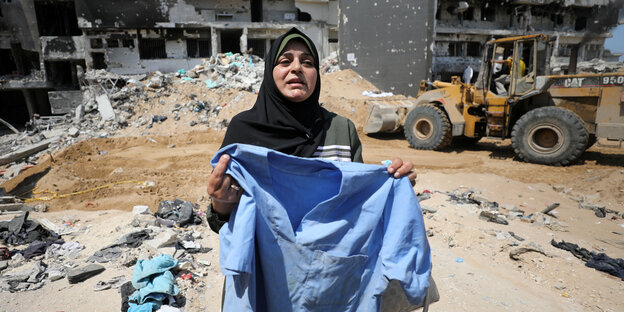The German delegation declares Nicaragua's claim before the International Court of Justice unfounded. Aid programs have increased enormously.

A woman in the rubble of Gaza City Photo: REUTERS/Dawoud Abu Alkas
HAGUE taz | On the second day of hearings at the International Court of Justice in The Hague, the German delegation responded to Nicaragua's accusation. He had accused Germany of complicity in the genocide due to its “political, financial and military support for Israel”, that is, a genocide that the Israeli army is currently committing in the Gaza Strip.
Tania von Uslar-Gleichen, director of the foreign ministry's legal department, said in her summary that Nicaragua's accusations had “no legal or factual basis.” Germany has not violated the Genocide Convention or international law.
As head of the delegation, the international law expert also opened the defense and made some fundamental decisions: In the current situation in the Gaza war, Germany is doing “everything possible to do justice to both sides.” He pointed to humanitarian aid for Palestinian civilians, which has tripled since the start of the war. At the same time, he stressed that Germany had learned from history and, given its responsibility in the Shoah, stood firmly on the side of Israel, whose security depended on German reasons of state.
From the beginning of the argument it was clear once again to what extent international law has become the scene of political conflict after the Gaza war and how complex this terrain is. Von Uslar-Gleichen emphasized that Germany continues to advocate for the Palestinian people's right to self-determination and supports a two-state solution. Nicaragua, on the other hand, accused Nicaragua of having a “unilateral” view that denies Israel's right to exist in the accusation itself. He cited that the Hamas massacres of October 7 were directed against “settlements in the occupied Palestinian territories.”
Aid programs have increased significantly
Christian Tams, director of the Glasgow Center for International Law and Security (GCILS), spoke out against the accusation that Germany had jeopardized the existence of the UNRWA aid organization's work by temporarily suspending payments, especially in the current situation. By the end of January in question no payments had been due and Germany had even increased its aid to Gaza through partners such as Unicef and the UN World Food Programme.
Tams also referred to the “robust framework” for military exports. The description of Nicaragua here is “inaccurate at best and a deliberate misinterpretation at worst.” Despite the importance of Israel's security, here too each export is subject to a double ministerial review.
Furthermore, most of the military equipment supplied by Germany does not consist of weapons of war. The ammunition supplied is training material that is not suitable for combat missions. Tams's conclusion on the immediate measures demanded against Germany was: “Up close, Nicaragua's accusations collapse.”
Finally, Sorbonne law professor Paulo Palchetti criticized the absence of a third party – Israel – whose actions are really at stake here. At the same time, the accusation presupposes, first of all, that Israel is violating Article 1 of the Genocide Convention. However, the Court has not yet established this fact. It could take several years for the ICJ to rule on this in the South African lawsuit.